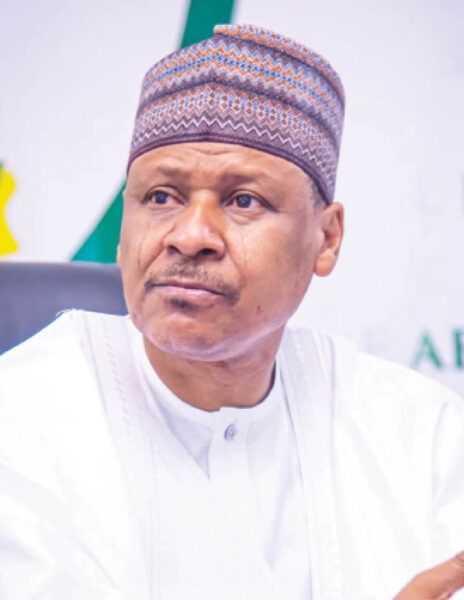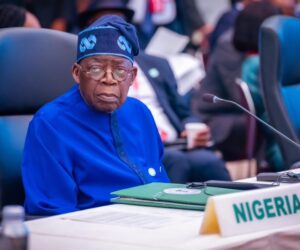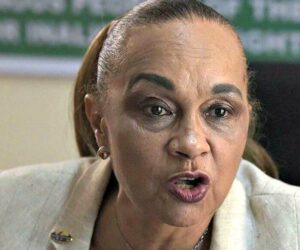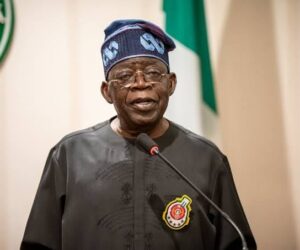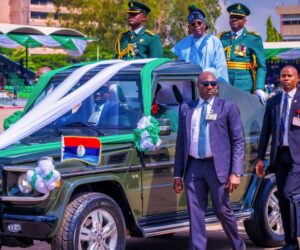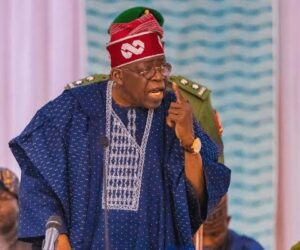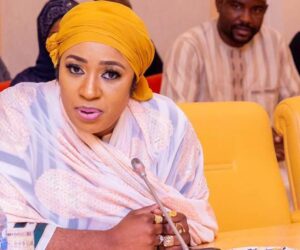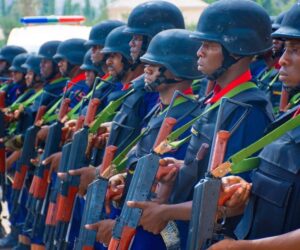In this interview with Weekend Trust, the Minister of Information and National Orientation, Mohammed Idris, enumerated some of the projects of the current administration while insisting that President Bola Ahmed Tinubu has been fair to all parts of the country. He said that infrastructure projects embarked upon in the past two years are spread across all regions.
The Tinubu administration has now been in office for two years. How would you assess its performance so far, particularly in terms of delivering on its promises?
SPONSOR AD
The administration of President Tinubu, two years after, has performed creditably, in accordance with its promises, contained in the eight priority areas of the Renewed Hope Agenda. The scale of positive impact is unprecedented. Fundamentally, the oil subsidy and forex cartels, two of Nigeria’s economic monsters, are gone, thereby freeing more revenue to the states and the federal government for infrastructure and other social and economic development. Most importantly, these two reforms have created market stability in the currency and oil and gas environment for local and international businesses.
President Tinubu, given the weak economy he inherited, has done remarkably well. Indeed, the reform of the economy for sustainable and inclusive growth is the president’s cardinal focus. In this regard, he has ticked all the boxes. We can clearly see almost a double or triple increase in federal allocation to states and local governments, a situation that is enabling state governments to do more at the local level. We have also attracted over $50 billion in new Foreign Direct Investment (FDI) commitments, while also netting a near five-fold growth of Net FX reserves from 2023 to 2024, to $23.11bn, despite repayment of over $10 billion in debts.
In agriculture, which engages more of our citizens, the president has achieved a feat by first recapitalising the Bank of Agriculture (BoA) to a N1.5 trillion level, thus making it competitive, nationally and internationally. He also established the Ministry of Livestock Development. We are indeed seeing a remarkable drop in food prices across our markets due in part to a massive distribution of fertilisers and other crucial farm inputs. Our nation’s food security is no doubt assured.
From the onset, the president was also clear about unlocking energy and natural resources for sustainable development. So much has happened in this regard, as over $8 billion in new oil and gas investments have been unlocked, in addition to about $500 million in investments through the Presidential Compressed Natural Gas (CNG) initiative. In the solid minerals sector, over 75,000 new jobs have been created, even as our nation’s daily power output has hit 6,003 MW, the highest ever daily power generated. In two years, our plans for a sustainable energy mix are on course. Hitherto, such directions did not have such clarity of purpose.
Over the years, our nation’s infrastructural deficit has been galling, to say the least. President Tinubu is working to address this, having identified infrastructure and transportation as enablers of growth and made it a core aspect of the Renewed Hope Agenda. The current road infrastructure projects are unprecedented, starting with what is called the Federal Roads’ Legacy Projects, viz., the 750km Lagos-Calabar Coastal Highway; the 1,058 km Sokoto-Badagry Superhighway; the 486km Calabar-Abuja Superhighway; the 421km Akwanga-Jos-Bauchi-Gombe Highway; the 375km Abuja-Kaduna-Zaria-Kano Highway; the 107km Enugu-Onitsha Expressway; the Kano-Kaduna Standard Gauge Rail Line, and the Fast-tracking of N1.5 trillion road concession projects under the Highway Development and Management Initiative (HDMI). There is also the ongoing infrastructure upgrades at airports nationwide, and the commencement of commercial operations on the Port Harcourt -Aba railway.
President Tinubu recognises that education, health, and social investment are essential pillars of development, which is why he is focused on Nigeria’s future generation. To start with, the National Education Loan Fund was established and now has over 400,000 beneficiaries across Nigerian tertiary institutions. Also, over N80 billion has been disbursed to revitalise over 8,000 primary health centres across the 36 states and FCT; over 2,500 health workers recruited, 60,000 others retrained. There’s also the introduction of zero tariffs, excise duties, and VAT on imported pharmaceutical inputs.
Last month, I joined the Honourable Minister of Health and Social Welfare, Dr. Muhammad Ali Pate, to commission three newly built cancer oncology centres in Katsina, Enugu, and Edo states. These are world-class cancer centres. Three more will soon be commissioned in other zones of the country. Cancer treatment is now available in Nigeria, all thanks to President Tinubu.
Also, the federal government has introduced YouthCred, a national consumer credit scheme for Nigerians aged 18–39, including NYSC members, to expand credit access and boost financial literacy. Aligned with the president’s Renewed Hope Agenda, the programme offers low-interest, collateral-free loans without guarantors, managed by the Nigerian Consumer Credit Corporation (CREDICORP). Launched in July 2025, YouthCred has reached its 1,000th beneficiary and targets 400,000 youths nationwide. For context, applicants are expected to complete a digital financial literacy course covering credit management, repayment, and responsible borrowing. Beyond loan disbursement, the initiative drives nationwide credit reorientation through gamified learning and a fully digital onboarding process using BVN and NIN for swift verification. In some cases, financed items, such as digital devices, are delivered directly.

Tied to this is the president’s resolve to accelerate diversification through industrialisation, digitisation, creative arts, manufacturing, and innovation. In this regard, there’s the training of three million youths on technology skills under the 3MTT programme, the establishment of the Creative Economy Development Fund (CEDF), the Restructuring of the Nigeria Youth Investment Fund (NYIF), and the N75 billion post-subsidy removal Presidential Loan for the manufacturing sector. Over 280,000 new jobs have so far been created in the cultural and creative industries.
Also, as part of a broader outreach for effective governance for service delivery, President Tinubu is keen on implementing the Local Government Autonomy based on the ruling of the Supreme Court. The establishment of five new regional development commissions and the Ministry of Regional Development attests to an uncommon resolve to reposition Nigeria through a bottom-top approach.
In addition to the petroleum subsidy removal and the unification of our foreign exchange regime, a third leg of President Tinubu’s reform agenda is the new set of Tax Reform Bills, four in all, signed into law on 26 June 2025. The Acts comprehensively overhaul the Nigerian tax landscape to drive economic growth, increase revenue generation, improve the business environment, and enhance effective tax administration across the different levels of government. The new tax regime comes into full effect in 2026 and will significantly bring about fundamental changes in the ease of doing business in Nigeria.
Well, the jury may still be out on all these achievements you have highlighted, but there have been reports, including from mainstream media, raising concerns about the distribution of capital projects. How equitable would you say the spread has been across the six geopolitical zones?
The distribution of capital projects under President Bola Ahmed Tinubu is being equitably implemented. No region is playing a second fiddle. All six regions have a regional development commission to re-kickstart development efforts. While the coastal highway courses through the South, the Badagry-Sokoto Highway traverses the North. In addition, the Tinubu administration has secured funding for light rail projects in Kano and Kaduna states to the tune of N150 billion and N100 billion, respectively. The metroline projects, which include Lagos and Ogun states, are part of government efforts to develop Nigeria’s light rail infrastructure. The projects are expected to create over 250,000 jobs across various states.
As part of efforts to expand oil and gas exploration in Northern Nigeria, four oil wells have been drilled in the Kolmani area of Bauchi State, in addition to the Ajaokuta-Kaduna-Kano (AKK) gas project, which will fuel power plants for manufacturing and domestic use in Kaduna, Kano, and other Northern states, upon completion.
But the analysis of some data on the distribution of capital projects suggests that Lagos State has received a disproportionate share of these projects. How do you respond to that?
This is a wrong perception. Indeed, all geopolitical zones have a fair share of President Tinubu’s legacy infrastructure projects, with the North, collectively, having a fair share of the projects.
With the data revealing that Lagos has had the highest share, some supporters of the president argue that the state deserves more because it generates the highest revenue. Do you consider this a valid justification for the concentration of projects?
Lagos State, despite being Nigeria’s economic nerve centre, is treated fairly, like all other states, in the distribution of federal projects.
Beyond capital projects, there have also been allegations of nepotism in federal appointments under this administration…
President Bola Ahmed Tinubu is not nepotistic. He’s a pan-Nigerian and continues to spread equal opportunity to all.
While supporters of the president argue that past administrations also faced similar accusations, critics insist that President Tinubu, given his cosmopolitan outlook and political background, was expected to set a higher standard. How do you reconcile these contrasting views?
President Tinubu has indeed set impartial standards in governance. He’s at home in every part of Nigeria, and he has thus far appointed capable Nigerians to man various strata of government.
Despite your insistence on equitable distribution of projects under the administration, going by available data, some observers say the patterns of project distribution and appointments could undermine national cohesion and trust in government. What steps is the administration taking to address these concerns?
The pattern of projects’ distribution under President Tinubu aligns with the need for national cohesion, which is glaringly at play.
Having lately returned from a tour of federal government infrastructure projects in the South East, specifically in Enugu and Ebonyi states, I was impressed by the level of hardcore and social investment projects being embarked by the two state governments. This suggests that state governments, with more federal revenue at their disposal, are doing a great deal in their domains. Reports from other states also suggest the same efforts are ongoing.
On the whole, President Tinubu has not only kept his promises but has proved to be the most pragmatic and consequential reformer in contemporary Nigeria.

